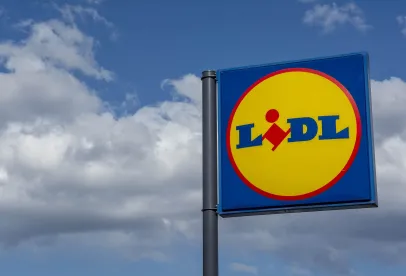In a recent decision, the High Court of England and Wales has found that Tesco’s use of the yellow and blue Tesco Clubcard logos (reproduced below) infringed Lidl’s trade marks (see the relevant Lidl marks below) and also gave rise to copyright infringement and passing off.
The supermarket chains have been in a battle over the use their respective signs with a square blue background and yellow circle. For further information on the background to the dispute you can read our previous article here (Lidl Great Britain Limited v Tesco Stores Limited [2022] EWHC 1434 (Ch)).

(the “Lidl Marks”)

(the “Tesco Clubcard Logos”)
The Decision
In 2020 Tesco introduced a new logo for their Clubcard loyalty discount scheme and Lidl claimed its competitor had infringed their trade mark, copyright and goodwill rights by using a logo that closely resembled their own.
Ultimately, the Court found that due to use of a yellow circle and a blue square background the Tesco Clubcard Logo were sufficiently similar to Lidl’s logo mark which featured the LIDL name and the similarities could not be absolved by using any wording in combination with the signs (noting that both parties used wording such as “LIDL” or “CLUBCARD PRICE” on top of the signs). To make this determination, the Court relied upon on the extensive evidence submitted in these proceedings, including internal communications and a feedback survey actually filed by Tesco which showed concerns of similarities between the two signs during the development of the Clubcard logo.
The Court determined that it was therefore apparent that a connection or link between the two marks would be made in the mind of the average consumer. The similarities ultimately led to a dilution of the distinctive character of Lidl’s mark, as Lidl conducted a price comparison advertisement campaign to correct customer’s impressions that the prices of Tesco goods would match Lidl’ prices. Tesco was also found to have taken unfair advantage of the distinctive reputation for low price value of the Lidl marks by communicating a message implying it offered goods at low prices matching Lidl’s. Despite the fact that Tesco did not have an intention to free ride on or take unfair advantage of the reputation of Lidl’s mark, the Tesco mark did inadvertently have this effect.
Use of the Tesco Clubcard Logo by Tesco was also found to give rise to a finding of passing off. The mere fact that customers made a connection between the two signs and were under the impression Tesco’s goods are of the same price level and quality as Lidl’s, was sufficient for Lidl’s passing off claim.
Lastly, the judge also held that the Lidl logo is protected by copyright due to the combination of text, colours and shapes. Even though the Tesco Clubcard Logo was designed by an external design agency, Tesco had decided to use the design which reproduced a substantial part of Lidl’s logo and therefore infringed Lidl’s copyright.
Despite the loss for Tesco, the Court did accept Tesco’s argument that Lidl’s registration for the wordless sign should be invalidated. Tesco argued Lidl’s first filing of the wordless mark was made in bad faith as there had never been an intention to use the sign in that form, and Lidl has never used the wordless mark since filing. Additionally, Tesco claimed that Lidl’s further applications of the sign were a form of ‘evergreening’, seeking to avoid cancellation actions based on non-use. The High Court agreed with Tesco on this point and invalidated four of the wordless registrations.
Takeaways
The case acts as a reminder that regardless of the size of a brand they can still be subject to IP infringement claims (and that even when dealing with brands it is important to consider potential liability arising out of non-trade mark infringement claims such as copyright and passing off).
Sufficient clearance searches and due diligence prior to any major marketing campaign is highly advisable for all brands. In Tesco’s case, the UK’s largest supermarket chain, the brand may well have conducted such a risk assessment and proceeded despite the similarity between the Lidl Marks and the Tesco Clubcard Logo.
With respect to ‘evergreening’, the case highlights that bad faith is assessed at the time of filing and brands will have to prove they have an intention to use a mark at that time. It is advisable for brands to adequately document and record files that show an intention of good faith filing and to continuously review their trade mark portfolios to ensure they can evidence sufficient use of their marks and avoid invalidation claims.
However, as Tesco has already confirmed they seek to appeal the case, this might not be the end of the battle of the supermarkets just yet.





 />i
/>i
